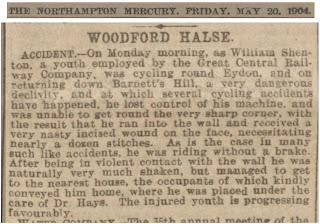The Sheffield and Rotherham Independent Wednesday April 11 1900
THE BARNSLEY RAILWAY SMASH
ADJOURNED INQUEST
Yesterday forenoon, Mr. P. P. Maitland, coroner, held the adjourned inquest at the Town Hall, Barnsley, relative to the circumstances attending the death , of Bernard Outram, aged 25 years, stoker, of Railway Cottages, Staveley, who died from severe scalding sustained in the railway accident at Smithies on the morning of the 30th ult. on the Great Central Railway.
It will be remembered the express goods train from East Ardsley to Annesley, of which deceased was the fireman, was wrecked owing to the main line being fouled by several wagons of a goods train. Both the driver (Richard Shenton) and the deceased were injured, the latter dying at the hospital from severe scalding.
There were present at the inquiry Mr. Froudainer, district superintendent ; Mr. Barber and Mr. Preston of the locomotive department of the Great Central Railway; Mr. J. H. Dobson, of the A.S.R.S.; Mr. Jos. Raley, solicitor, who held a watching brief; Supt. A. C. Quest, and the Chief Constable (Mr, G. H. Butler), the widow of deceased was also present.
Geo. Hall, railway guard, of Mexboro‘, employed by the Great Central Company, was recalled and questioned as to several statements. Replying to Mr.Raley, witness said he could not have unintentionally given a signal with his hand to Ibbotson, the driver of the pilot engine. He knew from the position in which he carried the lamp.
Frederick Rutherford, of 31, Schofield Street, Mexboro', said he was the driver of the goods train from Mexboro' to East Ardsley, which stopped at Smithies Siding on the morning in question. He explained his train was there divided for shunting. Witness engine shunted the wagons into the loop, and he stayed at the water column for the engine to take water. After he had finished taking the water he blew a pop whistle to indicate he had finished taking water.
When you blew the whistle did you intend the pilot engine to put back to you?—No.
Why not?—I knew it would not be wise owing to the position of the wagons.
He would have run into you?—Yes.
Witness added he had only got three or four wagons distant from the water column when he heard the crash. He shut steam off and applied the brake. Witness last saw Hall ten minutes or a quarter of an hour before the accident, when the wagons were un-hooked.
If you had blown a long whistle would it have been an instruction for him to move?—It might have led him to more.
If you had blown a long whistle would it have been an instruction for Ibbotson to move?—Not altogether.
I don't know what you mean.-He wants a signal from the guard.
Is there any rule on that point as to a "pop" whistle and a long whistle?—Well, we always do so; it is the understanding we work on.
If you blow a long whistle is it necessary for the guard to more?—the guard should give a signal.
Witness added: If I had blown a. long whistle I should say I was to blame, but I didn't. I would not think of giving a signal, but would leave it to the guard.
David Cass, fireman, of 110, Church street, Mexboro’, explained he was on the engine with the last witness, and said he only heard at short whistle given, which was to indicate the engine was on the move.—By a Juror: It was usual for the train engine to back the wagons to the wagons on the pilot engine.
Dr. Goodman, house surgeon at the Beckett hospital, said deceased was admitted suffering from severe scalds on the body. He sank and died the next day. He made a post-mortem examination of the body, but found no fracture. Death was due to exhaustion and shock.
The Coroner intimated at this stage that Ibbotson the driver of the pitot engine, could give evidence if he wished, and pointed out the serious allegations against him.—Mr. Raley, who represented Ibbotson, said his client desired to give evidence.
Geo. Ibbotson, of 28, St. John terrace, Grace Street, Barnsley, engine driver, after being cautioned in the usual way, explained he was the driver of the pilot engine, to which was attached six wagons and guard’s brake of the goods train. He said the engine was standing on the main line waiting for the signal.
What sort of a whistle was it?—Just one short whistle.
And hearing that short whistle?-I considered that was my signal.
Witness added he just opened the whistle and gave his engine steam, and then heard the crash.
By Mr. Raley: Rule 183, relating to signals to engine drivers, did not apply to drivers of pilot engines. He had been a driver for three years, and I it was usual to take the signal from the train engine. Witness thought when he started they were going straight away. Witness thought the train had been coupled together again fully ten minutes before he moved. It was usual to signal to the train engine. They seldom signalled to the pilot engine.
The Coroner summed up, pointing out that the early part of the evidence set up serious statements against the driver of the pilot engine, but subsequently they had conflicting statements. They did not always seem to adhere to general rules. If a man deliberately broke a rule and caused the death of a person then their verdict should be manslaughter; if, however, they considered the driver of the pilot engine was not bound to wait for a signal from the guard, or that be misunderstood or thought the whistle from the train engine was a signal, then it would be an unfortunate accident. The Jury, after consultation, returned a verdict of “Accidental Death,” adding an expression that though the accident was originally due to the pilot engine driver Ibbotson, they did not attribute any criminal neglect or blame at all.



